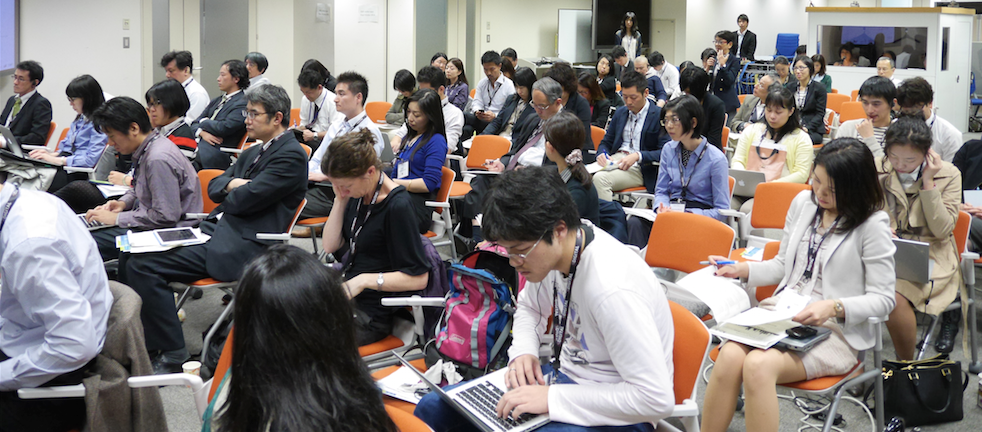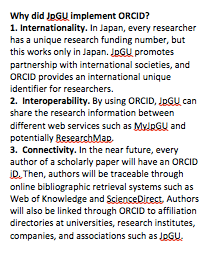(日本語)
ORCID hosts an outreach meeting twice a year, to provide an update on technical developments, member integrations, and researcher adoption. These meetings are also an opportunity for us to meet and listen to our stakeholders in the research community.
 In November, we held our Outreach meeting in Tokyo. It was our thirteenth meeting (#orcid13), and the first held outside of the US or Europe. The National Institutes of Informatics hosted the event, which featured speakers from Japan, Taiwan, Hong Kong, and Korea. To better support sharing of ideas, we provided simultaneous translation between Japanese and English. The meeting programme and speaker slides are available on the ORCID events page, including an update on ORCID and our 2015 technical plans.
In November, we held our Outreach meeting in Tokyo. It was our thirteenth meeting (#orcid13), and the first held outside of the US or Europe. The National Institutes of Informatics hosted the event, which featured speakers from Japan, Taiwan, Hong Kong, and Korea. To better support sharing of ideas, we provided simultaneous translation between Japanese and English. The meeting programme and speaker slides are available on the ORCID events page, including an update on ORCID and our 2015 technical plans.
Jun Adachi, Deputy Director of NII, opened the meeting with a summary of the national research infrastructure landscape in Japan. The KAKEN-ID is the national researcher identifier in Japan, required by the Japan Society for the Promotion of Science (JSPS), the national research funder. NII manages JAIRO, a national cloud-based publication repository, and the NACSIS shared catalogue and name authority file. NII also provides CiNii, an index with academic society journals. Among all these services, name ambiguity is a common problem. Hideaki Takeda, NII Professor and ORCID Board member, expanded upon the struggle with shared identifiers and metadata, describing the organizations inside and outside Japan, databases, resources, and over 35 million items involved. “Researchers live with many identifiers, “ Hideaki explained, “NII is interested in how we can help researchers manage and benefit from these identifiers.” NII have launched a Researcher Name Resolver service (RNS), of which ORCID is a component, with the goal of linking research information within Japan and to outside sources. Hideaki explained that name identifiers are at the core of the transformation of research, from an individual, manual, somewhat isolated endeavor, to one that is much more interconnected and digital, and where data itself can be both a product and input.
Developments by publishers are enabling this interconnectivity. Choon Shil Lee, of the Korean Association of Medical Journal Editors (KAMJE) spoke about the critical issues of name ambiguity for Korean researchers, where close to 50% of people share one of three last names, and it is not uncommon to find a paper with authors who share a first and last name. In this circumstance, she explained, a name-based content search is ineffective. Unique, digital identifiers are absolutely necessary, and for KAMJE, ORCID provides an international solution to both disambiguate names and internationalize Korean research. Ed Pentz, Executive Director of CrossRef, discussed the need for explicit connections between a work, its authors, and the contributions of each. These connections—enabled by digital identifiers such as ORCID—underlie knowledge discovery: discovery within and across databases, records management, and reviewer selection. He stressed the need for researcher engagement and effective implementation of identifiers by research organizations. In addition to the key role CrossRef plays in issuing and managing digital document identifiers, CrossRef will be implementing a workflow to push article information to ORCID, for those articles that journals deposit in ORCID with an authenticated ORCID iD. While time is needed for the network effects of ORCID to be realized, Pentz was confident that it would soon be seen as a “must have” by researchers and community systems.
The second panel explored how identifiers can be used to support visibility of research and researchers. Sunny Choi, of the Korean Institute of Science and Technology Information (KISTI), described research performance management in Korea, use of ORCID in publishing platforms, and plans to leverage ORCID  APIs in KISTI’s author identification system. Mitsuru Mizuno, of the Japan Science and Technology Agency (JST), spoke about the need for evidence-based R&D policy. He described the JST Knowledge Infrastructure, which interconnects information about funding, publications, datasets, and researchers. He saw ORCID as a key input to this infrastructure, in particular the ResearchMap database of Japan’s researcher directory. Working with NII, JST has enabled linkage and data exchange between ResearchMap and ORCID. Mikiko Tanifuji, of the National Institute for Materials Science (NIMS), debuted ORCID de Ninja, an experts profile project undertaken to improve the visibility, connectedness, and mobility of early career researchers working at NIMS. An earlier project had linked NIMS authors to preprints and articles using NIMS staff identifiers. However, over 20% of NIMS staff are not Japanese, and regardless of nationality researchers are highly mobile. NIMS turned to ORCID to provide an international, researcher-held identifier that could be linked with the NIMS identifier but persist throughout an individual’s career, and allow researchers to bring with them their NIMS researcher profile information to their next position.
APIs in KISTI’s author identification system. Mitsuru Mizuno, of the Japan Science and Technology Agency (JST), spoke about the need for evidence-based R&D policy. He described the JST Knowledge Infrastructure, which interconnects information about funding, publications, datasets, and researchers. He saw ORCID as a key input to this infrastructure, in particular the ResearchMap database of Japan’s researcher directory. Working with NII, JST has enabled linkage and data exchange between ResearchMap and ORCID. Mikiko Tanifuji, of the National Institute for Materials Science (NIMS), debuted ORCID de Ninja, an experts profile project undertaken to improve the visibility, connectedness, and mobility of early career researchers working at NIMS. An earlier project had linked NIMS authors to preprints and articles using NIMS staff identifiers. However, over 20% of NIMS staff are not Japanese, and regardless of nationality researchers are highly mobile. NIMS turned to ORCID to provide an international, researcher-held identifier that could be linked with the NIMS identifier but persist throughout an individual’s career, and allow researchers to bring with them their NIMS researcher profile information to their next position.
 We then turned to a discussion about implementation of ORCID by universities and professional associations. Chris Chan of Hong Kong Baptist University and Hao-Ren Ke of the National Taiwan Normal University, presented their experiences rolling out ORCID in a university environment. Both institutions were driven by the increasing pressure to demonstrate performance and to enhance the research culture. Having accurate public research information for their faculty is critical, and they saw the potential of ORCID in addressing name ambiguity on an international scale. Another important benefit was reducing the time required of faculty to update their research record in the university and national research reporting systems. Yasuhisa Kondo, of the Japan Geoscience Union Information System Committee, described how JpGU was using ORCID for a similar purpose: to maintain researcher records, in this case to enable scientific interactions between JpGU members. “ORCID can connect research information at different websites. This is a great potential of ORCID, in our view,” Kondo said.
We then turned to a discussion about implementation of ORCID by universities and professional associations. Chris Chan of Hong Kong Baptist University and Hao-Ren Ke of the National Taiwan Normal University, presented their experiences rolling out ORCID in a university environment. Both institutions were driven by the increasing pressure to demonstrate performance and to enhance the research culture. Having accurate public research information for their faculty is critical, and they saw the potential of ORCID in addressing name ambiguity on an international scale. Another important benefit was reducing the time required of faculty to update their research record in the university and national research reporting systems. Yasuhisa Kondo, of the Japan Geoscience Union Information System Committee, described how JpGU was using ORCID for a similar purpose: to maintain researcher records, in this case to enable scientific interactions between JpGU members. “ORCID can connect research information at different websites. This is a great potential of ORCID, in our view,” Kondo said.
A thread connecting all of the presentations was the need to engage with researchers to gain full benefit of ORCID. Just before the meeting, with translation assistance from Ambassador Soichi Tokizane, we released a Japanese language version of the ORCID Registry. However, we rely on research organizations in Japan and elsewhere to interact directly with researchers, through integration of ORCID identifiers into research workflows coupled with active promotion of those tools. Events such as the Outreach meeting help to bring the community together to demonstrate prototypes, discuss plans, and coordinate efforts.
For more information on ORCID events, see our Events page. Our next Outreach meeting will be held in Barcelona, May 18-20, 2015.
